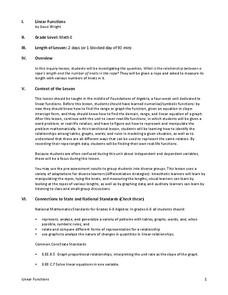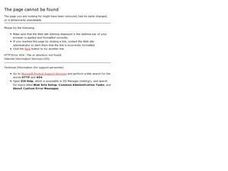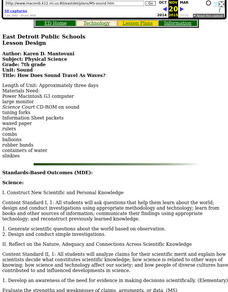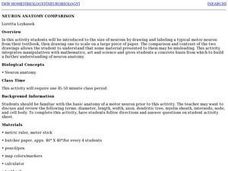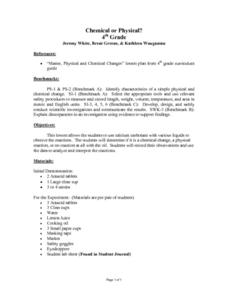Curated OER
The Box Problem
Students create graphic, algebraic and verbal ideas of functions. In this algebra lesson, students graph functions and identify the zeros of the functions. They find the domain and range and classify functions as relation or not.
Curated OER
Pythagorean Theorem
Students solve problems using the Pythagorean Theorem. In this geometry lesson, students identify the sides and angles of a right triangle. They find the different trigonometric ratios and solve using sine, cosine and tangent.
Curated OER
Honey Bee Anatomy and Identification
Students examine and dissect a worker honey bee to analyze the structures and functions of honey bees. They draw the structures they see and compare/contrast them to drawings or electron micrographs.
Curated OER
Linear Functions
Students solve and graph linear equations. In this algebra activity, students collect data and plot it to create a linear function. They identify the domain and range of each line.
Curated OER
Sundials: Observing and Using Shadows
Students build sundials and observe changes in shadows over the course of one or more days. They identify patterns in the shadows and discuss how shadows may be used to tell time.
Curated OER
Labs from Chicago, Summer 1993: Calibrating the Sun's Light
Students experiment with the luminosity of the Sun's light. For this luminosity lesson, students participate in an experiment with luminosity of the sun and flashlights. They make filters and fiber optic sources.
Curated OER
The Strength of the Muscular System
Seventh graders investigate the strength of the muscular system. They explore voluntary and involuntary muscle movement and discuss the types of muscles: cardiac or heart, skeletal, and smooth. They visit stations to answer questions...
Curated OER
The Proof
Students will construct simple curves on graph paper by connecting a series of points between the vertical and horizontal axes. They share their designs and explain the patterns.
Curated OER
Do Caterpillars Eat More As They Get Bigger?
Learners observe caterpillar behavior and the amount of milkweed leaves the caterpillars eat each day. They collect data regarding the caterpillar's size and anything else they see. They look for patterns in caterpillar eating habits and...
Curated OER
Arithmetic Artistry
Learners create a classroom quilt that illustrates the many unique ways that students use math skills.
Curated OER
Field Work
Young scholars realize that everyone lives in a watershed and that water is a fundamental life sustaining resource, they investigate ways to look at surface streams for quantity and quality of this vital resources. Students construct a...
Curated OER
Wigwam
Students create models of wigwams. They discuss winter and summer villages and the types of wigwams. They construct a wigwam using information from the Native American website to follow the scale. They present their models to the class...
Curated OER
Chef for a Day
Students make chocolate chip cookies. In this cooking lesson, students follow a recipe by doing each step in sequence.
Curated OER
Shining the Light on Skin
Students investigate the relationships between certain environmental factors and levels of exposure to sunlight. The variables of location, time of year, and day, and the weather which affect the intensity of the sun are explored in this...
Curated OER
Perimeter of Polygons
Eighth graders discuss perimeter by relating it to the path they would take while walking their dog around a park. They find the perimeter of regular polygons and one irregular polygon. Students use graph paper to draw their own examples...
Curated OER
Volume, Surface Area for Rectangular & Triangular Prisms
Seventh graders explore the concept of rectangular and triangular prisms. In this rectangular and triangular prism instructional activity, 7th graders identify various prisms as triangular or rectangular. Students discuss the various...
Curated OER
History of Our Solar System Time Line
Ninth graders explore the concept of ratios. In this ratio activity, 9th graders construct a to scale time line that starts at the beginning of time. Students determine the correct placement of big events in time such as when the...
Curated OER
Discovering Density
Students explore the physical properties of density. In this hands-on lesson, students calculate density and distinguish between intensive and extensive properties.
Curated OER
Paper Gliders
Sixth graders study friction and drag. In this science activity, 6th graders use different models of gliders and test to see which of the gliders fly the farthest. Students analyze their data and construct a graph.
Curated OER
Friction and Gravity
Seventh graders identify the factors that determine the strength of the friction forces when two objects push against each other. Describing the difference between weight and mass, they participate in experiments. They state the law of...
Curated OER
How Does Sound Travel As Waves?
Seventh graders participate in a number of activities designed to increase their understanding of how sound is generated and how it travels.
Curated OER
Math: Gears and Wheels
Twelfth graders solve problems involving linear and angular speed. Using information about a compact disc, they solve the problem using multiple rates and conversion factors. Students also solve additional problems involving bicycle...
Curated OER
Neuron Anatomy Comparison
Students create a scale model of a motor neuron that is two hundred times larger than the actual neuron. They identify the structures of a neuron and observe neurons under the microscope then use a worksheet to convert actual sizes into...
Curated OER
Chemical or Physical?
Fourth graders make observations of the reactions that happens between calcium carbonate and various liquids. During the experiment the students determine if there is a chemical change, a physical reaction, or no reaction when they mix...



